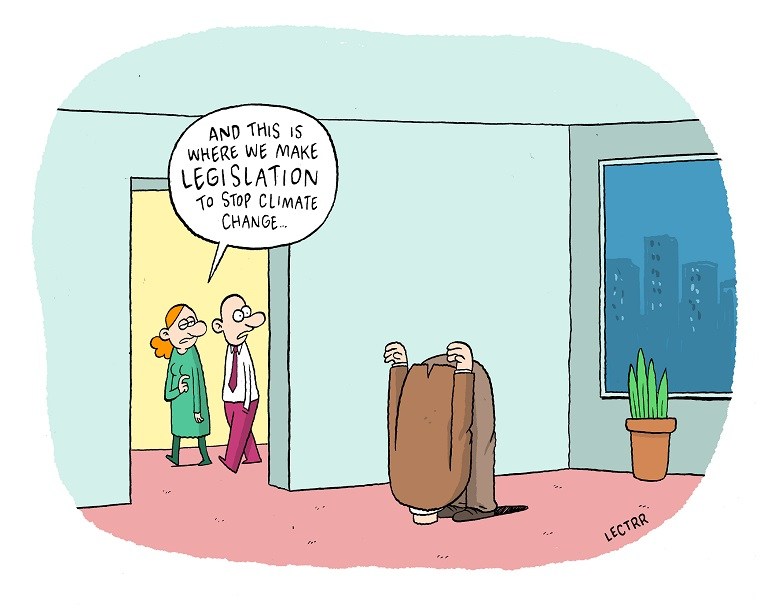A nudge for nature
The 303-page long coalition agreement of the newly formed Flemish government was met with great criticism. Some claimed an agreement this long is evidence of the fact that the coalition partners don’t trust each other, so every single idea and ambition has to be documented. Others criticized the agreement because of its content: too radical a shift towards the right. After all that has been said and done, I’d like to express my sympathy for at least one single line in the agreement. The Flemish government announced that its garden and park maintenance teams will stop using two-stroke engine devices, such as leaf blowers and lawn mowers.
One could obviously wonder: why does this matter? Well, it matters for several reasons. First, those devices are a source of noise pollution. In the United States, several people have gone to court because they found the noise of these devices, frequently used in their neighbourhoods, too disturbing. Secondly, two-stroke engines have a detrimental effect on air quality. They are terribly polluting.
Grand scheme of things
In 20 Californian cities, the use of two-stroke engine leaf blowers is already forbidden. In 2022, the US state of Washington will also ban the devices. Now Europe has to join the effort, for it is better to take small steps in the right direction than to stand still and do nothing.
Leaf blowers might seem a trivial matter, but they are not. We should be more aware of their ecological impact. And let’s not forget that small measures on a large scale can have a big impact. One could compare it with the ban on disposable plastics that was approved by the European Parliament last year.
What are plastic straws or cotton buds in the grand scheme of things? Evidently, something banal and trivial. And yet, with a ban – especially on the European level, so it applies to 28 countries and more than 500 million people – we can reduce the plastic soup and the heap of waste we constantly create. A prohibition will not immediately make the things banned disappear from the surface of the earth. But they are a great incentive for producers and consumers to look for more environmental-friendly alternatives.
1770 km driving
That it would be wrong to think of the ecological impact of leaf-blowers as just a minor issue, is evidenced by a study commissioned by the California Environmental Protection Agency. According to that study, using a two-stroke engine leaf blower for one hour emits a similar level of smog-forming pollution as driving a family car for 1770 kilometres. Indeed, 1770 km. Belgians drive, on average, 15.000 km per year. That means that a leaf blower only has to be used for 8.5 hours per year in order to produce similar smog-forming emission levels as a family car annually.
100.000 cars
But how many leaf blowers are there in our country? That is of course impossible to determine. But we do know how many of those tools are being sold. According to Fedagrim (the Belgian federation of suppliers of machines and utilities for farming and garden maintenance), about 22,000 leaf blowers are being sold per year. Most of them (71%) run on gas (with either 2-stroke or 4-stroke engines). If we assume that 10,000 of them run on a 2-stroke engine, and these blowers have a life span of 5 years, we would have a total of 50,000 highly polluting leaf blowers in our country.
You don’t have to be a mathematical genius to calculate their impact on the environment. If these blowers were being used 8,5 hours per year, their level of pollution would be compared to that of 50,000 cars per year. If these blowers were used for 17 hours per year, we are already talking about 100,000 cars per year. And so on. And so on. Clearly, this is not a trivial matter. Furthermore, beside leaf blowers, two-stroke engines are also frequently used in other devices, such as lawn mowers. Hence, the ecological impact of two-stroke engines is certainly not a minor issue.
Nudge
The decision of the Flemish government can rightly be seen as a nudge for nature. Nudge is a concept in behavioural economy, popularized by Richard Thaler, winner of the Nobel Prize in Economics and Harvard Law School professor, Cass Sunstein. In 2008, they wrote a book on how nudging can help people make better decisions about their health and well-being. A nudge is a way of influencing people’s behaviour without coercing them.
If more governments take measures to discourage the use of two-stroke engines, the producers of devices using such engines will be motivated to change their business plans. Most leaf blowers today still run on two-stroke engines, for they are easier and cheaper to make. But there are alternatives that are better for the environment: electric leaf blowers, or blowers on 4-stroke engines. With nudges, we can stimulate the production and consumption of eco-friendlier maintenance devices. It might just be a small step for mankind, but it is not a futile step.
By Alicja Gescinska


